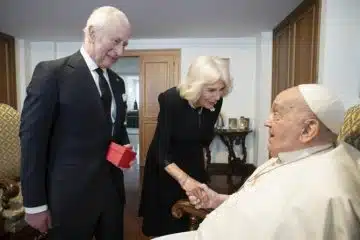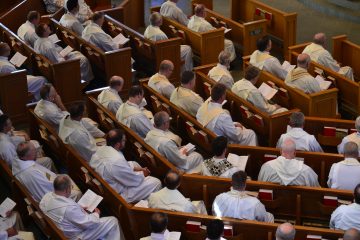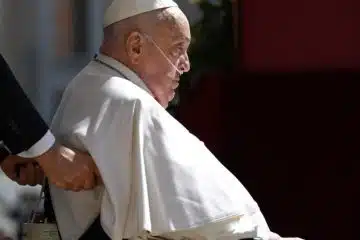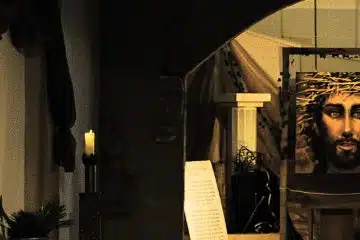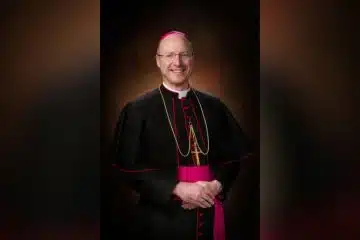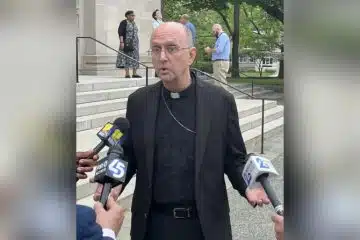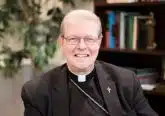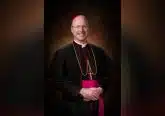New Assisi shrine is reminder to shed attachment to money, pope says
By Cindy Wooden
VATICAN CITY (CNS) — Like St. Francis of Assisi did, the Catholic Church and individual Christians must follow Christ by imitating his willingness to give up everything for the sake of others, Pope Francis said.
“Unfortunately, 2,000 years after the proclamation of the Gospel and eight centuries after the witness of Francis, we face a phenomenon of global inequity and an economy that kills,” the pope said in an April 16 letter to the archbishop of Assisi, Italy.
The pope’s letter offered his blessings and support for the decision of the Diocese of Assisi to establish a shrine in memory of the “divestiture” of St. Francis.
The shrine, which will be inaugurated May 20, will be housed in the town’s Church of St. Mary Major, but also will include public access to the “Sala della Spogliazione,” literally the Room of the Divesting. The room in the bishop’s residence is where a young St. Francis — in the presence of his father and of the bishop — stripped naked and renounced all wealth.
“Renouncing all earthly goods, he unchained himself from the enchantment with the god money, which had seduced his family,” the pope wrote in his letter to Archbishop Domenico Sorrentino of Assisi.
“The new Assisi shrine is born as a prophecy of a society that is more just and more in solidarity,” the pope said, but it also “reminds the church of its obligation to live, in the footsteps of Francis, stripping itself of worldliness and dressing itself with the values of the Gospel.”
Pope Francis said he is certain St. Francis did not act out of a lack of respect for his father, a wealthy merchant, but out of a conviction that “one who is baptized must put love for Christ above all other affections.”
In 2013, when Pope Francis went to Assisi for the first time as pope, he met in the “Sala della Spogliazione” with individuals and families assisted by the local Catholic charities. In his April letter, the pope wrote that the people gave witness to “the scandalous reality of a world marked by a gap between an immense number of indigent people, often deprived of the most basic necessities, and the miniscule number of the rich who possess the majority of wealth and think they can determine the destiny of humanity.”
But in following Christ, he said, “we are all called to be poor, to strip ourselves of our egos; and to do this we must learn how to be with the poor, to share with those who lack basic necessities, to touch the flesh of Christ! The Christian is not one who speaks about the poor, no! He is one who encounters them, who looks them in the eye, who touches them.”
The church must make Christ its model for the way it deals with worldly goods and the way it treats the poor, the pope said.
St. Francis “had received the mandate” to repair the church of his time, he said. And while the church “is holy in the gifts it receives from on high, it is formed by sinners and so always in need of repentance and renewal. And how can it renew itself if not by looking upon its naked Lord? Christ is the original model of the ‘divesting,'” making himself a slave and dying for the sins of humanity.
“The divesting is a mystery of love,” the pope said. “It does not mean despising the world. How could it? The world comes from the hands of God.”
But, Pope Francis said, it does mean using creation and worldly goods carefully and in solidarity with those who have less access to what they need to survive.
Goods must be used according to a “hierarchy of values that gives first place to love,” he said.
– – –
Copyright © 2017 Catholic News Service/U.S. Conference of Catholic Bishops. www.catholicnews.com. All rights reserved. Republishing or redistributing of CNS content, including by framing or similar means without prior permission, is prohibited. You may link to stories on our public site. This copy is for your personal, non-commercial use only. To request permission for republishing or redistributing of CNS content, please contact permissions at cns@catholicnews.com.



